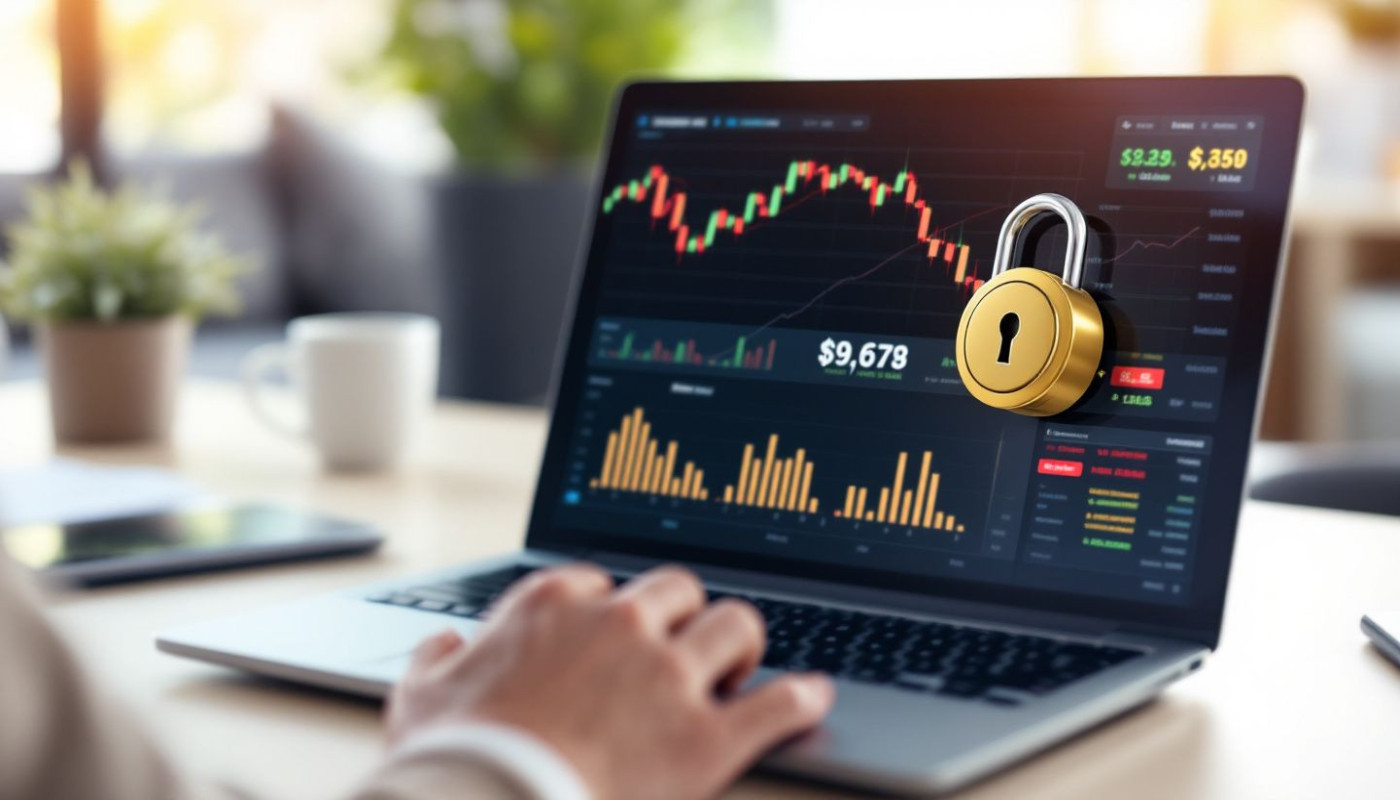Table of contents
Online currency trading has become increasingly popular, offering exciting opportunities to profit from global market movements. However, with this surge in digital trading comes a heightened risk of cyber threats targeting trading accounts. Secure practices are necessary to protect financial assets and maintain peace of mind, so explore the essential steps below to safeguard your online currency trading activities.
Strengthen your password protection
Creating strong passwords is a foundational element for ensuring currency trading security. To maximize online account safety, always craft passwords that feature a mix of uppercase and lowercase letters, numbers, and symbols. Aim for a minimum length of 12 characters, as longer passwords are significantly more resistant to brute-force attack. Regular updates are vital; changing your password every few months greatly reduces the window of opportunity for unauthorized access. A password manager is highly recommended for generating and storing complex, unique passwords for each of your accounts, reducing the temptation to use easily guessed or repetitive patterns.
Reusing passwords across multiple platforms is a dangerous practice that greatly increases vulnerability to prevent hacking. If one account is compromised, hackers can employ the same credentials to infiltrate other services, including your online currency trading accounts. Therefore, exclusivity is crucial: each account should have its own distinct password, unrelated to personal information or previous logins. Password managers not only simplify managing multiple credentials but also alert users to potential breaches or weak passwords, adding an extra layer of defense for your financial assets.
Common mistakes undermine even the strongest security measures. Avoid writing passwords on paper or storing them in unencrypted digital notes, as these can be easily accessed by unauthorized individuals. Instead, use a reputable password manager with strong encryption standards. When creating passwords, steer clear of sequential numbers, dictionary words, and personal information such as birthdays or names. By implementing these best practices, you can significantly enhance the overall security of your currency trading accounts and protect yourself from evolving cyber threats.
Enable two-factor authentication
Activating two-factor authentication (2FA) plays a pivotal role in maintaining a secure trading account, especially for those engaged in online currency trading. Multi-factor authentication provides an added shield beyond the conventional password, requiring a second form of verification to access your account. This second layer can take several forms: SMS codes sent to your mobile device, time-based codes generated by authentication apps, or physical hardware tokens that produce unique access codes. Each method raises the bar for online trading protection, making it significantly harder for cybercriminals to breach your accounts.
Employing 2FA security is effective because even if a password is leaked or stolen, a hacker would still need the secondary authentication factor to log in. SMS-based verification is widely used, though it can be vulnerable if your phone number is hijacked. Authentication apps, such as Google Authenticator or Authy, generate time-sensitive codes on your device and are generally more secure than SMS. Hardware tokens deliver an even higher level of security, as they are independent from both your computer and mobile phone, thus reducing exposure to digital threats. Understanding the strengths and weaknesses of these options helps prevent unauthorized access and ensures a more robust defense for your investments.
When selecting a 2FA method to protect your online currency trading accounts, convenience should be balanced with security. Authentication apps offer a strong mix of safety and usability, while hardware tokens are ideal for those demanding maximum security, despite their higher cost and the need to carry an extra device. Always avoid relying solely on SMS if possible, as it is susceptible to SIM swap attacks. In the end, integrating multi-factor authentication with your existing security practices will significantly enhance your online trading protection and fortify your position against unauthorized access attempts.
Monitor account activity regularly
Consistent account monitoring is vital for currency trading safety. Begin by frequently reviewing your login history to confirm that all sessions were initiated by you. Scrutinize trade confirmations and any account changes, such as updated personal information or modified security settings, for unauthorized attempts. Employ trading account alerts and real-time security notifications, which immediately inform you of new logins, large trades, or unusual access locations, leveraging anomaly detection techniques for suspicious activity detection. This proactive approach enables swift identification of irregularities before they escalate into larger financial risks.
To amplify your defenses, always use secure devices and trusted networks when accessing trading platforms, as unsecured Wi-Fi or outdated software can expose your credentials. Should you notice any unrecognized actions, reporting suspicious activity to your trading provider immediately is a key aspect of maintaining account integrity. For example, those interested in detailed guidance on secure platform usage and account monitoring can go to my site for further resources. Implementing these steps ensures that your exposure to online threats is minimized, fostering a safer trading environment.
Update software and platforms
Keeping all related software, apps, and trading platforms up to date offers a strong foundation for online trading safety. Regular software updates address newly discovered vulnerabilities and often include a security patch that specifically targets emerging threats exploited by cybercriminals. When trading platform security is maintained through prompt updates, it becomes much harder for attackers to gain unauthorized access or disrupt your activity. Rely on trusted sources such as official app stores or the provider’s website for all updates, and never download files from unofficial sites, as these may contain malware or compromise sensitive information.
Enabling automatic update notifications ensures that important security patch releases are not missed, making patch management more streamlined and effective. Frequent checks for security advisories from your platform’s provider or reputable cybersecurity organizations can further reinforce your defenses. Outdated systems, on the other hand, are attractive targets for cybercriminals who exploit known weaknesses. By staying vigilant and proactive about software updates, you protect your investments and uphold the integrity of your online trading account.
Educate yourself about phishing threats
Phishing prevention is a key aspect of trading account security, especially as online trading threats become more sophisticated. Cybercriminals frequently target currency traders through deceptive emails that mimic legitimate financial institutions or trading platforms. These messages often contain urgent requests to verify account information, malicious attachments, or links to fake websites designed to steal credentials. In addition to emails, social engineering tactics may include phone calls or direct messages that exploit trust and manipulate traders into sharing sensitive data. Recognizing these scams involves scrutinizing sender addresses, being cautious with unsolicited requests, and avoiding the download of unexpected attachments.
To avoid scams, always confirm the legitimacy of communication by contacting your trading platform directly through official channels, never sharing passwords or security codes with anyone. If faced with a suspicious email or message, do not click on links or provide any personal details. Instead, report the incident to your platform’s support team and follow any recommended protocols for reporting cyber incidents. Using multi-factor authentication tools and updating passwords regularly adds another layer of protection, making it harder for attackers to gain unauthorized access.
Maintaining cyber awareness requires ongoing education. Many trading platforms and cybersecurity organizations offer specialized training modules and resources tailored to online trading threats. Participation in regular workshops or webinars will help keep your knowledge current and sharpen your ability to detect phishing attempts. Reliable sources such as the Anti-Phishing Working Group or your trading platform’s security center provide updates on emerging threats and practical advice for continuous improvement in trading account security.
On the same subject

How Tailored Tax Services Can Simplify Complex Fiscal Duties?

Maximizing Benefits From Your Offshore Business Structure?

Exploring The Benefits Of A 0% Corporate Tax Structure

How Transparent Pricing In Conveyancing Simplifies Property Deals

New apartments for sale in Sint-Maarten at the luxury The Hills Residence !

Exploring The Benefits Of Investing In Luxury Urban Properties

Exploring The Benefits Of Securing A Crypto License For Business Growth

Exploring The Benefits Of Luxury Real Estate Investment

Exploring The Variety Of Luxurious Properties Available For Purchase On The French Riviera

